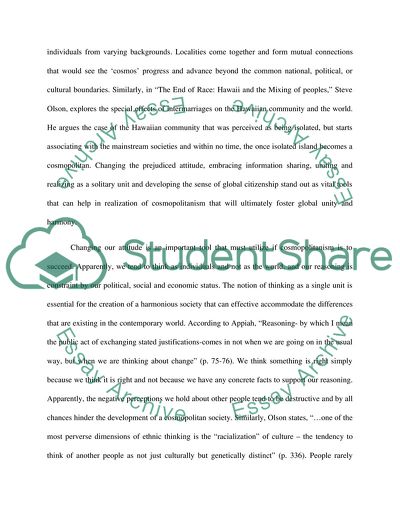Cite this document
(Development of Cosmopolitanism Essay Example | Topics and Well Written Essays - 1500 words, n.d.)
Development of Cosmopolitanism Essay Example | Topics and Well Written Essays - 1500 words. https://studentshare.org/philosophy/1847241-engage-appiah-and-olson-in-a-conversation-to-explain-what-tools-are-needed-to-enact-cosmopolitanism-and-what-responsibilities-does-a-cosmopolitan-have-toward-oneself-as-well-as-local-and-global-communities
Development of Cosmopolitanism Essay Example | Topics and Well Written Essays - 1500 words. https://studentshare.org/philosophy/1847241-engage-appiah-and-olson-in-a-conversation-to-explain-what-tools-are-needed-to-enact-cosmopolitanism-and-what-responsibilities-does-a-cosmopolitan-have-toward-oneself-as-well-as-local-and-global-communities
(Development of Cosmopolitanism Essay Example | Topics and Well Written Essays - 1500 Words)
Development of Cosmopolitanism Essay Example | Topics and Well Written Essays - 1500 Words. https://studentshare.org/philosophy/1847241-engage-appiah-and-olson-in-a-conversation-to-explain-what-tools-are-needed-to-enact-cosmopolitanism-and-what-responsibilities-does-a-cosmopolitan-have-toward-oneself-as-well-as-local-and-global-communities.
Development of Cosmopolitanism Essay Example | Topics and Well Written Essays - 1500 Words. https://studentshare.org/philosophy/1847241-engage-appiah-and-olson-in-a-conversation-to-explain-what-tools-are-needed-to-enact-cosmopolitanism-and-what-responsibilities-does-a-cosmopolitan-have-toward-oneself-as-well-as-local-and-global-communities.
“Development of Cosmopolitanism Essay Example | Topics and Well Written Essays - 1500 Words”. https://studentshare.org/philosophy/1847241-engage-appiah-and-olson-in-a-conversation-to-explain-what-tools-are-needed-to-enact-cosmopolitanism-and-what-responsibilities-does-a-cosmopolitan-have-toward-oneself-as-well-as-local-and-global-communities.


